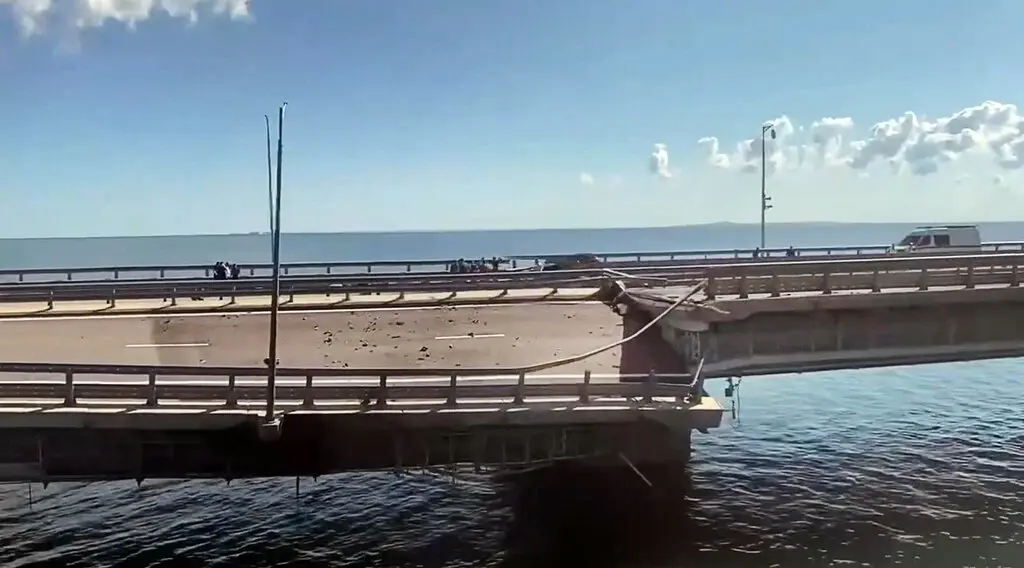An attack before dawn Monday damaged part of a bridge linking Russia to Moscow-annexed Crimea that is a key supply route for Kremlin forces in the war with Ukraine, forcing the span’s temporary closure for a second time in less than a year. Two people were killed and their daughter was injured.
Vehicle traffic on the Kerch Bridge came to a standstill, while rail traffic across the 19-kilometer (12-mile) span also was halted for about six hours.
The strike was carried out by two Ukrainian maritime drones, Russia’s National Anti-Terrorist Committee said.
Ukrainian officials were coy about taking responsibility, as they have been in past strikes. But in what appeared to be a tacit acknowledgment, Ukrainian Security Service spokesman Artem Degtyarenko said in a statement that his agency would reveal details of how the “bang” was organized after Kyiv has won the war.
Hours after Monday’s attack, video from Russian authorities showed men in fatigues picking up debris from the deck of the bridge, a section of which appeared to be sloping to one side, and a damaged black sedan with its passenger door open.
Russian Deputy Prime Minister Marat Khusnullin said authorities were inspecting the damage before determining how long it will take to repair.
The Kerch Bridge is a conspicuous symbol of Moscow’s claims on Crimea and an essential land link to the peninsula, which Russia illegally annexed in 2014. The $3.6 billion bridge is the longest in Europe and is crucial for Russia’s military operations in southern Ukraine in the nearly 17-month-old war.
Russia has expanded its presence in Crimea since its full-scale invasion of Ukraine in February 2022. Occasional sabotage and other attacks against the Russian military and other facilities on the peninsula have occurred since, with the Kremlin blaming Ukraine.
The bridge attack comes as Ukrainian forces are pressing a counteroffensive in several sections of the front line. It also happened hours before Russia announced, as expected, that it is halting a deal brokered by the United Nations and Turkey that allows the export of Ukrainian grain during the war.
Russian media identified the dead as Alexei and Natalia Kulik, who were traveling to Crimea for a summer vacation. The 40-year-old Kulik was a truck driver and his 36-year-old wife was a municipal education worker. Their 14-year-old daughter suffered chest and brain injuries.
Kyiv didn’t initially acknowledge responsibility for October’s bridge attack either, but Deputy Defense Minister Hanna Maliar acknowledged earlier this month that Ukraine struck it to derail Russian logistics. At the time, Moscow decried it as an act of terrorism and retaliated by attacking Ukraine’s civilian infrastructure, targeting the country’s power grid over the winter.
Dmitry Medvedev, deputy head of Russia’s Security Council, returned to that theme Monday, calling the Ukrainian government a “terrorist organization.”
“We must blow up their houses and houses of their relatives, search and eliminate their accomplices,” he said.
Russian authorities said the attack didn’t affect the bridge’s piers but damaged the deck on one of two road links. The damage appeared less serious than in October’s attack.
Andriy Yusov, a spokesman for Ukraine’s military intelligence department, declined to comment but said: “The peninsula is used by the Russians as a large logistical hub for moving forces and assets deep into the territory of Ukraine. Of course, any logistical problems are additional complications for the occupiers.”
The Security Service of Ukraine posted a redacted version of a popular lullaby, tweaked to say that the bridge “went to sleep again.”
Russia halts wartime deal allowing Ukraine to ship grain. It’s a blow to global food security
Russia, meanwhile, has halted a breakthrough wartime deal on Monday that allows grain to flow from Ukraine to countries in Africa, the Middle East and Asia where hunger is a growing threat and high food prices have pushed more people into poverty.
Kremlin spokesman Dmitry Peskov said Russia would suspend the Black Sea Grain Initiative until its demands to get its own food and fertilizer to the world are met. While Russia has complained that restrictions on shipping and insurance have hampered its agricultural exports, it has shipped record amounts of wheat.
“When the part of the Black Sea deal related to Russia is implemented, Russia will immediately return to the implementation of the deal,” Peskov said.
The suspension marks the end of an accord that the U.N. and Turkey brokered last summer to allow food to leave the Black Sea region after Russia’s invasion of its neighbor worsened a global food crisis. The initiative is credited with helping lower soaring prices of wheat, vegetable oil and other food commodities.
Ukraine and Russia are both major global suppliers of wheat, barley, sunflower oil and other affordable food products that developing nations rely on.
The grain deal provided assurances that ships won’t be attacked entering and leaving Ukrainian ports, while a separate agreement facilitated the movement of Russian food and fertilizer. While Western sanctions do not apply to Moscow’s agricultural shipments, some companies may be wary of doing business with Russia because of the measures.
Ukrainian President Volodymyr Zelenskyy’s adviser, Mykhailo Podolyak, said the suspension was expected and believes it’s political theater.
“The statement itself immediately includes an escape clause,” he said. “Therefore, we are dealing with classic public techniques of the Russian Federation that no longer require significant reciprocal reactions.”

